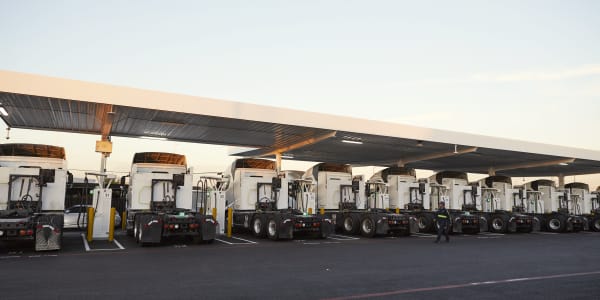In 2014, Ginkgo Bioworks entered Y Combinator as the first biotech company ever accepted by the famed accelerator. Four years later the Boston-based synthetic biology start-up, founded by a team of MIT scientists in 2009, has raised $429 million, including from Cascade Investment, the asset management firm of Bill Gates, and is reportedly worth $1 billion.
Over the last several years, Ginkgo has developed an automated process for combining genetic parts that has made it the largest designer of printed DNA in the world. That breakthrough has positioned the start-up to change the face of a variety of industries and helped to earn it the No. 21 spot on the 2018 CNBC Disruptor 50 list.
Last October, Ginkgo entered into a $100 million partnership with the global health-care and agriculture giant Bayer to engineer microbes capable of producing fertilizer for crops, like corn, wheat and rice.
"We're really building the platform that lets you design organisms," said CEO Jason Kelly, who studied chemical engineering at MIT.
Essentially, synthetic biology involves reconfiguring the genome of an organism to get it to do something entirely new. Kelly likens it to computer programming, only with genetic sequences. So think of DNA as computer code, and then imagine you can design sequences of DNA on the computer, physically print out those sequences, and insert them into microorganisms such as yeast and bacteria so they make products like rose-scented oil for perfume or sweeteners for beverages.
"We're learning how to rewrite the code of life," said Frances Arnold, a professor of chemical engineering, bioengineering, and biochemistry at the California Institute of Technology. "We're seeing a move toward making things that either chemistry cannot make or can't make efficiently but biology does."
The idea of modifying the DNA of organisms precedes the moniker of synthetic biology by many years. Genetic modification dates back to the 1980s, and genetic engineering for biofuels in the agricultural, pharmaceutical and energy industry has been common practice for some time. Think of Monsanto's Bt corn, which uses a modified bacteria to protect crops from damaging insects, and you have the idea. Such work has normally been the purview of highly trained scientists, but companies like Ginkgo are catching fire now, thanks to a confluence of factors.
"We can read DNA and write DNA very cheaply now. We can synthesize DNA in ways we couldn't just five years ago," Arnold said.
Last December, Ginkgo opened Bioworks3, its third laboratory space. It also closed a $275 million funding round, money that will go toward financing a fourth lab space set to open later this year.
At Ginkgo's labs the difficult work of synthetic biology is conducted through computer software and run by robotics. This is the platform idea that animates Kelly's company: By figuring out a standardized way to combine genetic parts, the same process can be applied across a number of industries to produce goods at fractions of their current costs or to create entirely new products.
"That's the core idea we have: DNA is code, and you can read and write it in these factories and test how it works," Kelly said. "So you're going to go to your computer, specify the exact sequence you want, print it, put the DNA into a tube or into an organism and test how it works."
The fertilizer market is ripe for a huge disruption
That's why Bayer chose to partner with Ginkgo. The artificial fertilizers commonly used across the United States are produced by sucking in atmospheric nitrogen gas, which plants can't use, into chemical plants that then convert the gas into a solid form plants can use. But nitrogen fertilizer products from chemical plants are notorious for releasing tons of carbon into the atmosphere.
"Agriculture has exploded because we've been able to provide synthetic nitrogen fertilizers. What a lot of people are looking for today is a more sustainable long-term approach," said Mike Miille, CEO of Joyn Bio, the joint venture Bayer and Ginkgo formed last fall.
Crops like soybeans and peanuts have microbes in their roots that perform the same reaction that chemical plants do — such crops, in other words, produce their own fertilizer. Corn, wheat and rice, however, do not. Joyn Bio plans to use the genetic engineering expertise Ginkgo has developed to modify the microbes of such plants so that they, too, can pull nitrogen gas from the air and convert it into fertilizer.
There are thousands of companies trying to create agricultural breakthroughs, and one or more of these ideas could be huge one day.Mark ConnellyStephens analyst who covers fertilizer companies
Joyn Bio plans to develop other disruptive agriculture tech, still unspecified, over time, but nitrogen fixation is its first target for a reason. Hundreds of millions of tons of fertilizer flow into the global agricultural market each year, generating sales of nitrogen fertilizer worth billions of dollars to the biggest companies, such as Nutrien and CF Industries.
The global fertilizer companies are acting as if their dominance will continue. Stephens analyst Mark Connelly said the major fertilizer companies continue to focus major capital expenditures, in the billions, on building traditional fertilizer plants, an indication they don't see a need to invest in heavily in potential disruptive technologies. The total global fertilizer market is expected to reach as high as $250 billion in the coming years, though potash-based fertilizers are also a significant component of supply in addition to nitrogen-based soil nutrients.
It's not entirely new to attempt to disrupt the nitrogen supply chain in agriculture. Monsanto, for example, created a venture with Evogene in 2007 to create a nitrogen gene technology that would increase crop yields. It never came to market.
More from CNBC Disruptor 50:
The current tech bubble is bigger than the one in 2000
How 23andMe founder Anne Wojcicki is leading a DNA revolution
Oscar Health has a vision of fairer pay for doctors and clearer pricing for patients
"In general, agricultural applications appear to be serving as testing grounds for many genetic engineering companies for whom the human market is years away," said John Prendergass, an associate director at Ben Franklin Technology Partners in Philadelphia. "Given lower regulatory barriers and potential for early revenue generation, partnerships like this make a lot of sense."
Connelly said these microbial start-ups that are working on ag replacement products, such as microbes rather than fertilizer to fix nitrogen, are a huge area of interest and activity. "There are thousands of companies trying to create agricultural breakthroughs, and one or more of these ideas could be huge one day, but it is also currently a huge space. It's the Wild West right now, but there will be some real prizes in there," he said.
Bayer's $100 million investment in Ginkgo is "a lot of money," Connelly said. "It is basically giving them the mezzanine financing now so they won't be forced to buy this start-up from a PE company in five years."
Synthetic biology is also being extended to consumer goods, like foods, fragrances and clothing. As a result, companies like Ginkgo are becoming increasingly attractive bets for investors. From 2012 to 2016, investment in synthetic biology start-ups increased from $374 million to $1.2 billion, according to data from CB Insights.
"Investors love platforms, and DNA is the ultimate platform," Prendergass said.
What remains challenging is generating profits, and that's a direct result of how tricky the concept of synthetic biology is. Composing sequences of genetic parts that effectively produce a new drug or can enable the microbes of the corn plant to produce its own fertilizer are complex problems.
"Inside of a living cell there are thousands of proteins that enable it to make more of itself and make your malaria drug, for instance. We don't understand those. We don't understand how they work together," Arnold said.
That's a challenge that Ginkgo Bioworks is tackling head-on in 2018. In addition to the money the start-up raised last year, it also acquired Gen9, a Boston company that prints DNA. Buying the company enabled Ginkgo to begin printing sequences of DNA very cheaply, Kelly said. Ginkgo has been building up what Kelly called a "code library of usable genetic code."
Again, think of it like software: When a programmer begins writing an app for the iPhone, they don't start that project from scratch. There are programming languages already available. The same is true for the synthetic biology projects of tomorrow, Kelly said.
"As the cost comes down, this technology can apply to other areas," Kelly said. "The whole idea behind Ginkgo is that it's the same kind of work regardless of what you're engineering."









